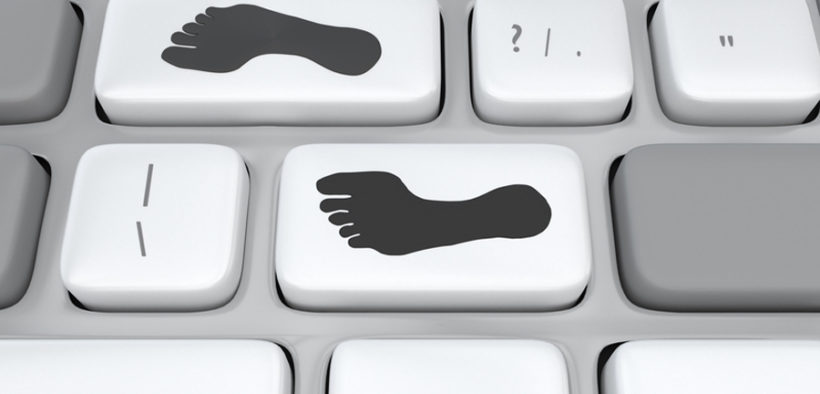Practical Techie: Footprints, keep tabs on your digital persona

At a slow pace, with each new post and every platform, we add to our web navigations, our digital footprint becomes wider, richer.
With each new tack of our web surfing habits, we also forfeit a bit of privacy because algorithms trace our steps and shopping sites peek into our banking information. Also, into our tastes, consumer tracks, and our whims.
Soon it becomes time to begin blotting out some of our digital footprints, maybe take a cyber-break or completely remove ourselves from social networks. Clean up our cybernetic persona act.
What constitutes our digital footprint? The emails we send, the conversations we have through social media, both private and public, as well as the photos we share, the videos we watch, and the websites we visit. All shape our digital profile.
Our physical identities, however, are more difficult to erase. In any case, it is almost impossible to make yourself invisible on the internet, since the advanced artificial intelligence of the system will track you sooner or later through your IP, or Internet Protocol which is your particular user number hidden inside your computer and other hardware.
But yes, we can erase some of that virtual person through applications on the web that offer to disappear much of the digital trail that we leave behind during our interactions with the networks. At least our most daring virtual adventures.
There is the idea that once something is online, it is immortal, immutable, and almost impossible to erase. It’s a partial truth. In other words, you shouldn’t put anything online that you don’t want your grandmother to see. Or, in the long run, your grandchildren when your adventurous content comes back to haunt you.
At such a junction, cybernauts must realize that it’s wise to keep our virtual footprints under control because it isn’t just about the information we plunk online. There’s a ton of data about our digital life passively collected by companies we visit on the Web. Let’s look at this more closely.
GOODBYE — There are many reasons netizens need to retrace their networks. Many get tired of their personal data being ruffled around the web. Google, Facebook, Instagram, Twitter, et al, do not forego any of our virtual footsteps. Some platforms trace into our political preferences and sell the data to campaign managers.
Many times, we also become victims of cyber ogres and get tired of battling insults, harassment, intimidation, predations and revenge porn on the part of ex-boyfriends or girlfriends.
Others, when applying for a new job, want to hide some bizarre, youthful romps from a future employer. A misused tweet from years ago or an inappropriate photo on Facebook can destroy prospects for a new job or ruin a career. There’s ample literature already on such mishaps.
Similarly, a qualified investigator can locate your old criminal conviction on the Internet and cause a mess. Cyber criminals also want to damage our files, take control of our devices with cybernetic hexes such as digital viruses, malware, spyware or stalkware.
BODYGUARDS — It’s possible to travel incognito through cyberspace. It is a somewhat technical feat, but feasible. The best way is to use a virtual private network (VPN) which is to connect to servers that leave no traces. Just need to pay a fee for such an off-the-grid access. Another way to clean house is to use applications that maintain the user IP anonymous.
The problem is that these alternatives may seem suspicious to prime sellers. Another way to ensure the integrity of your phones or of your children is through the retinax.com, phone sheriff application. This software provides access control to your devices, blocks certain numbers or contacts, as well as locks geolocation of your calls and photos.
Another effective way to erase footprints is by deleting the oldest data on the wall of your social networks. It is tedious, but if you do it one, two or three times a week, little by little you erase a lot of your original traces on the Internet.
DETOX — If you are willing to pay, there are services on the Web that permanently cleans up your digital act. Deseat.me is one of them. It cleanses your online existence, erasing all the gaffes from the past from accounts such as Facebook, Evernote, Dribble, YouTube, Linkedin and Twitter.
Remember, deleting your accounts does not delete the shares, chats, instant messages or “likes” that you have sent to your friends.
The other app, Backgroundchecks.org helps you erase your links at companies with which you have made purchases or companies on the web that are dedicated to documenting user buying habits. You can do it yourself little by little or pay $129 to make it with one blow.
If you want to disappear from an old blog, go to whois.com, locate the owner of the portal and request removal of your file. Sometimes it works, other times no one bothers to help you. But insist. If you mistakenly put your social security number, private phone number, home address on any Google portal, go to support.google.com/ and ask to be removed. This one works well because Google is keen on user privacy.



